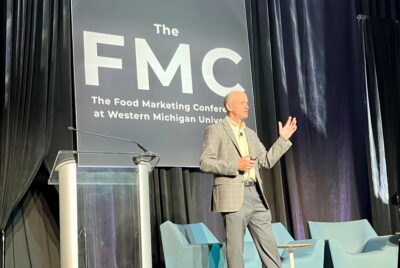Private brands have been on an absolute tear in recent years, growing sales across categories as more shoppers seek value in a challenging market.
But how can retailers and manufacturers maintain that momentum as inflation cools?
The answer lies in innovation and differentiation, says Jonathan Finch, vice president of client services for Daymon, which powers private brand development for Advantage Solutions. In other words, private brands can no longer coast on merely being the cheaper alternative — they need to grab the attention of shoppers through unique attributes and creative promotions.

For the inaugural Store Brands Month, launched by the Private Label Manufacturers Association, Finch sat down with MRKT blog to discuss the challenges and opportunities for private brands in 2025. The following interview has been edited for length and clarity.
Q. What’s coming in 2025 for private brands? They’ve been on an incredible growth trajectory. Do you see that continuing this year?
A. Certainly with inflation starting to recede, that will put even more focus on private brands to make sure that we can take advantage of the growth and the gains that we’ve made over the past several years. The biggest piece in our favor is, based on some of the proprietary studies that we’ve conducted, we’re seeing increased consumer acceptance.
As inflation continues to abate, people may say, ‘Hey, I’m going to treat myself to this more expensive brand of potato chip or this more expensive branded soda.’ It becomes even more important for us to make sure that we’re focusing on all of the normal blocking and tackling — but also finding new and different ways to keep consumers’ interest and keep them coming back.
Q. How can retailers better promote private brands?
A. Here’s a perfect example: If you go into a Costco and they have a Kirkland signature item there, you’ll see hundreds — maybe even thousands — of folks walking through the door every day trying that product for the first time. So enhanced sampling and demonstrations for private brands will be key.
Historically, private brands really haven’t had much of a voice when it came to digital and social media. More and more retailers and manufacturers are adopting platforms that allow them to engage in a bigger way than they have in years past. That’s going to be key to our growth — private brands being front and center, whether we’re talking about in store or on somebody’s mobile device or computer, or even potentially on their television.
And that is another reason why Store Brands Month is so valuable. The intention behind this initiative is to start the year off strong, with retailers marketing the presence and quality of their offerings, to shine a light on the products they can only get at their banners.
Q. It’s no secret that large retailers have been driving the growth of private brands — and really all retail growth — as shoppers have turned to club and mass channels. Where does that leave smaller, regional retailers?
A. For smaller, more regional grocers, it becomes increasingly important to find ways to differentiate themselves. As private brands were growing up, it was OK to be a “me-too” and to have the same cookies on the shelf as the guy down the street.
More and more, especially as there’s more pressure and consolidation in the industry, it becomes increasingly important to offer a point of differentiation in the actual product itself, the in-store experience and how you engage with your consumer.
Q. Is it more important for retailers to focus on value or is it more about those distinct flavors and attributes? Private brands aren’t just a value play anymore, right?
A. Value perception is different for every consumer. When we think of value at Daymon, it’s more about: What are you offering the consumer versus anything else that they could get?
That could be a premium product or a local flavor they can’t get with a national brand, or a unique size that offers value.
The retailers that are going to win are going to innovate and offer unique offerings and not just be a fast follower to national brands. They’ll instead set trends with their consumers and offer them things they haven’t seen before.
Q. Do you see obvious runway for private brands growth in certain kinds of stores or channels in the year ahead?
A. Right now, obviously, we’re seeing heavy growth, especially within the club and mass channels.
But as inflation continues to abate and people have more disposable income, they’re going to want to treasure hunt a little bit more. They’re going to want to be able to treat themselves to something that’s new and different. And that’s where mainstream grocery and smaller regional players, which often do a really good job of offering uniqueness, are really going to shine. And they’re going be able to really turn the tables a little bit.
Q. Do you see private brands growing in convenience stores?
A. Convenience stores are really starting to see the opportunity. At Daymon, more and more players in the convenience channel are asking us to help them because they see the opportunity for growth.
They’ve been leaning on Daymon for the past year or so to set their strategy, help them better understand their consumer and where they can effectively play.
Q. What type of private brand products are we talking about in c-stores?
A. Predominantly you think about snacks and beverage when you think about c-store. But we also see a big opportunity in some of the other goods that you may not think about, like household essentials, and health and beauty care items that people consider essential when they travel. Simple things like toothpaste or deodorant, acetaminophen, and even plastic cups and partyware.
I’ve done this plenty of times. We’re having a party. Well, there’s a convenience store a mile down the road and the big-box store is 10 miles away. I know I might pay a little more, but I’m going to the convenience store to grab that 50-count red plastic cup bag because it’s quick, easy and convenient.
That’s where I think the opportunity lies — to think more outside the box in convenience. Because historically most of those items have been branded. C-stores could flip the tables go to a 100% private brand solution in those areas if they do it the right way.
The private brand play for c-stores is similar to any other store or channel, and it always comes back to leveraging private brands as an extension of your unique value proposition in the market, to your consumer, across the store.




